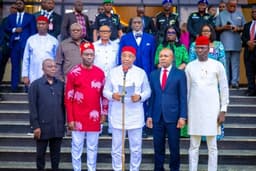
Senator Ted Cruz of the United States
When Ted Cruz, a United States senator, declared that Nigeria’s government was enabling a “massacre” of Christians, the world took notice. His claim, shared on social media and repeated in Congress, accused Nigerian authorities of ignoring what he called a “Christian genocide.”
“50,000 Christians have been killed since 2009, 2000 schools and 18,000 churches destroyed,” Cruz wrote on X. “The Nigerian government has looked the other way.”
His words had an impact. Within days, U.S. president Donald Trump redesignated Nigeria as a Country of Particular Concern, a label reserved for governments accused of tolerating religious persecution.
Trump warned that America could “stop all aid and assistance to Nigeria” and “go in guns-a-blazing” if the killings continued.
In Nigeria, President Bola Tinubu dismissed the allegations as “unfounded and misleading,” saying Nigeria “will not accept lectures from those who seek to profit from our divisions.”
The making of a conservative warrior
Rafael Edward “Ted” Cruz was born on December 22, 1970, in Calgary, Canada, to a Cuban father and an American mother. He often says his father’s story shaped his worldview.
Cruz graduated from Princeton University in 1992, where he was a champion debater, and went on to Harvard Law School, graduating magna cum laude. He clerked for William Rehnquist, the Chief Justice of the United States, becoming the first Hispanic to do so.
After working in the Justice Department and the Federal Trade Commission, he became Texas’s solicitor general in 2003. In that role, he argued nine cases before the U.S. Supreme Court—winning five—an achievement that made him one of the most recognised conservative lawyers of his generation.
The rise of a political firebrand
Cruz entered the U.S. Senate in 2013 after an upset victory over the Texas establishment. Backed by the Tea Party movement, he quickly became known for his confrontational style and hardline conservatism.
In 2013, he staged a 21-hour filibuster on the Senate floor, reading Dr. Seuss’s Green Eggs and Ham to protest President Barack Obama’s health care law.
That fight shut down parts of the federal government but cemented Cruz’s image as a crusader.
Three years later, he ran for president, winning several states before losing to Donald Trump. Their rivalry was bitter—Trump mocked Cruz’s wife and father but the senator eventually endorsed him, later becoming one of his staunchest allies. “We had our fights,” Cruz said. “But when President Trump does what he promised, I stand with him.”
Faith, ideology, and foreign causes
Cruz’s political identity is deeply tied to his faith. He often frames public life as a battle between belief and secularism, good and evil.
His foreign policy views flow from the same conviction. He has said that “those who hate Israel hate America,” and co-sponsored the Israel Anti-Boycott Act, which would criminalise participation in boycotts against Israel or its settlements.
He describes himself as a defender of religious freedom worldwide. It is that conviction that has now drawn him into Nigeria’s security crisis.
The Nigeria religious freedom act
In September 2025, Cruz introduced the Nigeria Religious Freedom Accountability Act, accusing Nigerian officials of “facilitating Islamic Jihadist violence and the imposition of blasphemy laws.”
“I have fought for years to counter the slaughter and persecution of Christians in Nigerians.”
The bill calls for sanctions on Nigerian officials said to be responsible for religious persecution and proposes that Nigeria be formally listed as a “country of particular concern.” It also seeks to identify Boko Haram and its splinter faction, ISWAP, as “entities of particular concern.”
Cruz’s insistence on a Christian persecution narrative has helped transform Nigeria’s internal conflicts into a U.S. political cause. It has rallied evangelical groups and conservative media around his message, portraying the Middle Belt violence as part of a wider global assault on Christianity. (BusinessDay)



























NEWS EXPRESS is Nigeria’s leading online newspaper. Published by Africa’s international award-winning journalist, Mr. Isaac Umunna, NEWS EXPRESS is Nigeria’s first truly professional online daily newspaper. It is published from Lagos, Nigeria’s economic and media hub, and has a provision for occasional special print editions. Thanks to our vast network of sources and dedicated team of professional journalists and contributors spread across Nigeria and overseas, NEWS EXPRESS has become synonymous with newsbreaks and exclusive stories from around the world.